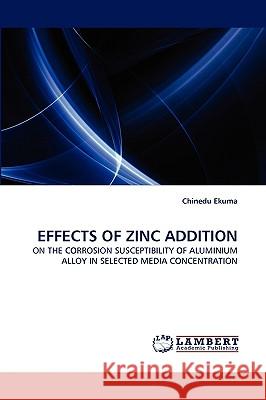Effects of Zinc Addition » książka
Effects of Zinc Addition
ISBN-13: 9783838364315 / Angielski / Miękka / 2010 / 108 str.
A study of the effects of increasing weight composition of zinc on the corrosion susceptibility of locally processed Al-base alloy in some media concentrations have been carried out. The results showed the normal corrosion rate profile of an initial steep rise, then a decrease, in all the media as the percentage of zinc increased. All the samples immersed in the brine media showed total passivation; a phenomenon attributed to supersaturation and preferential adsorption of the media species (alumina) on the metal surfaces. Comparatively, the susceptibility of the alloy was observed to increase as the acidic media concentration increases; and decreased with increasing brine concentration, a consequence of the increasing thickness of the passivated film. On the whole, the 2.5% zinc was the most severely attacked, possibly, implying a maximum solid solubility range (solvus line) in Al-Zn duplex alloy systems resulting in increased grain boundary concentration.
A study of the effects of increasing weight composition of zinc on the corrosion susceptibility of locally processed Al-base alloy in some media concentrations have been carried out. The results showed the normal corrosion rate profile of an initial steep rise, then a decrease, in all the media as the percentage of zinc increased. All the samples immersed in the brine media showed total passivation; a phenomenon attributed to supersaturation and preferential adsorption of the media species (alumina) on the metal surfaces. Comparatively, the susceptibility of the alloy was observed to increase as the acidic media concentration increases; and decreased with increasing brine concentration, a consequence of the increasing thickness of the passivated film. On the whole, the 2.5% zinc was the most severely attacked, possibly, implying a maximum solid solubility range (solvus line) in Al-Zn duplex alloy systems resulting in increased grain boundary concentration.











